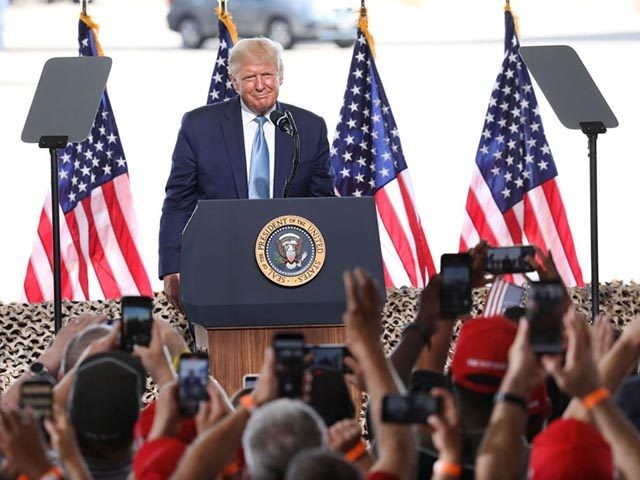President Donald Trump has “shattered” Washington D.C.’s bipartisan consensus on immigration, says Jeff Bezos’s Washington Post newspaper.
“Trump’s first term has shattered the decades-long bipartisan view of immigrants as a pillar of the nation’s identity,” the paper reported October 31:
During the past four years, his administration has issued scores of proclamations, regulatory changes, legal decisions and executive orders seeking to reshape immigration policy. A July report from the Migration Policy Institute, a nonpartisan research organization, put the number at more than 400.”
…Trump’s approach also has transformed the immigration issue in the GOP. In the past, figures like the late senator John McCain, George W. Bush and Mitt Romney were openly supportive of legal immigration, reflecting the views of the corporate and business wing of the party. Trump defied that consensus.
The article is closed for comments, perhaps because the article ignored the core issue of migration’s economic impact on Americans and their children since D.C. elites dramatically raised the inflow of migrant labor in 1965.
The inflow was imposed on Americans as their wages were climbing rapidly in the early 1960s and was further expanded in 1990 to eliminate wage growth during the subsequent 30 years, so helping maximize stock growth and the centralization of wealth. But Trump’s pro-American changes have helped change the nation’s labor market, and so household income rose seven percent during 2019:
The Washington Post article also ignored many important statistics, such as the 95 percent reduction in migrants who got over the U.S. border in 2020, and the roughly 1.3 million white-collar visa workers now in jobs needed by U.S. graduates. The newspaper also avoided the polls that show that the public strongly favors American employees’ economic interests over the employers who want to hire cheap migrants.
The newspaper also downplayed the intense opposition from Fortune 500 companies against Trump’s immigration reform, including opposition from Bezos’s Amazon and other technology firms. The corporate opposition is rational because Trump’s reforms include a pending rewrite of the rule for the white-collar H-1B visa program. Trump’s rewrite will likely be a big gain for many U.S. graduates — including the families of white-collar journalists — because the program has been used by the Fortune 500 companies to sideline millions of American graduates in favor of cheap, compliant, and disposable foreign labor.
By subscribing, you agree to our terms of use & privacy policy. You will receive email marketing messages from Breitbart News Network to the email you provide. You may unsubscribe at any time.
The paper did allow some of Trump’s deputies to sketch their case for Trump and his pro-American policies:
“He’s done what he said he’d do,” said Ken Cuccinelli, the second-ranking official at the Department of Homeland Security, in an interview defending Trump’s record as a wide-ranging, comprehensive effort to “make sure Americans come first.”
“I can’t think of another policy area where he’s encountered more hurdles, and he’s pressed ahead successfully,” Cuccinelli said.
Ken Cuccinelli is one of the leading advocates for the pro-American reforms that have nudged up Americans’ salaries, workplace productivity, and overall workforce participation.
Open-ended legal migration is praised by business and progressives partly because migrants’ arrival helps transfer wealth from wage-earners to stockholders.
Migration moves money from employees to employers, from families to investors, from young to old, from homebuyers to real estate investors, and from the central states to the coastal states.
Migration also allows investors and CEOs to skimp on labor-saving technology, sideline U.S. minorities, ignore disabled people, exploit stoop labor in the fields, short-change labor in the cities, impose tight control on American professionals, centralize technological innovation, undermine labor rights, and to get many progressive reporters to promote Wall Street’s economic priorities.


COMMENTS
Please let us know if you're having issues with commenting.